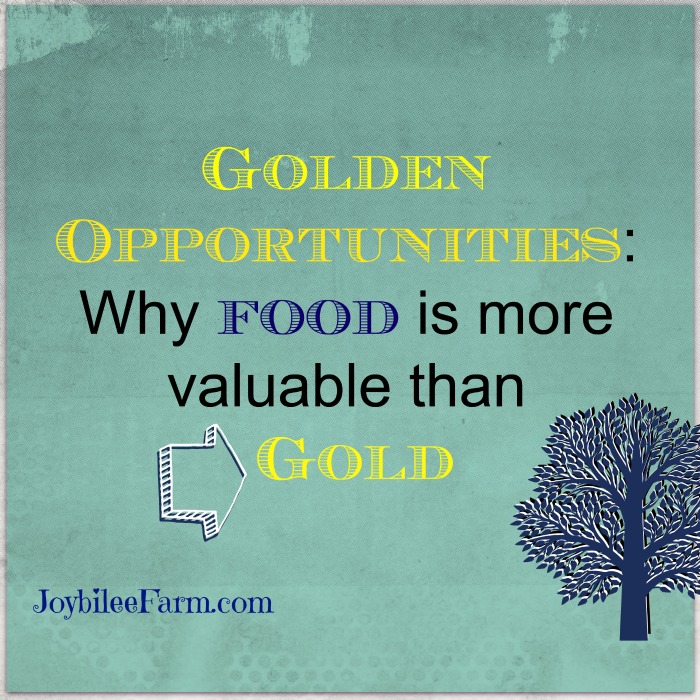“As the twin pillars of international monetary system threaten to come tumbling down in unison (the US dollar and the Euro) , gold has reclaimed its ancient status as the anchor of stability. The spot price surged to an all-time high of $1,594 an ounce in London, lifting silver to $39 in its train.” says, Ambrose Evans-Prichard, in an article in The Telegraph.
The economic climate is grim. The strong Canadian Dollar isn’t big enough to stem the world tide of economic uncertainty. Many self-sufficiency leaders will tell you to invest in gold in uncertain times. There is a limited amount of gold in the world, so economies based on the gold standard retain their value, while economies based on fiat power — paper money backed by debt — falter. Unfortunately, because there is a limited amount of gold in the world — only a few people can have it — keeping the price up as demand exceeds supply.
What we are facing very soon is economic uncertainty, high inflation, more bankruptcies and layoffs, more unemployment and a widening of the gap between the very rich and the poor, and rising interest rates. The standard of living will be lowering as more families try to buy the necessities of life with money that doesn’t stretch as far.
Yes, its true. There is an economic depression. And its going to get worse before it gets better. Should you invest in gold?
No.
To further complicate the economic scene — the cold Spring and summer droughts that are facing many of the world’s agricultural areas are heralding a shortage of wheat, and basic foods, which will raise prices. Energy costs are rising. Should you invest in gold?
No.
Can you eat gold? Will gold heat your home? Can you survive on gold alone?
No.
So is there anything you can do to be more resilient in the coming storm?
Stay the course. Continue to learn homesteading skills. Invest in the land, the livestock, the food stock. Get out of debt as quickly as you can.

In times of rapid inflation, the price of getting into land drops. Higher interest rates mean that there are fewer people looking for land and the market shifts to a buyers market. So first get out of debt and then look for land where you can build a small house — no bigger than your needs. If you can get onto land without buying it — do it soon.
While you work at reducing your household debt consider buying your food differently. Buy staples like flour, dried beans and rice instead of premade and packaged foods. Stock up for the winter if you are able, now, as food comes into season. Grow some fruit and vegetables. Pick blackberries or saskatoons in the wild and jam them or dry them for the winter.
Barter for what you need, as much as possible. Can you help a local vegetable grower with weeding in exchange for some of the crop? Can you do the bookkeeping for your local rancher in exchange for a side of beef? See a fruit tree with fruit dropping on the ground — ask the owner if you can help pick the tree in exchange for a portion of the fruit. Can, dry or freeze the bounty and do more than you think you need. Dried fruit will keep indefinitely, frozen fruit has a shorter shelf life. We’ll look at creative ways to store food next week.
What if you live in the inner city and there are no farms near you? You can grow in a planter or a pot in your apartment. And you can take steps to become more self sufficient. The urban farm guys in Kansas City are growing fish, fruit and vegetables on city lots. They just got approval for chickens.
Focus your energy on your basic needs — Food, shelter, clothing and community. Don’t worry, but actively pursue self-sufficiency, sustainability and a more remarkable life. You will grow your resilience to ride out the storm.
What steps are you taking to become more self-sufficient? Do you have any tips for our community? What do you think a person should do first? Leave a comment.



Milk can be attained by having goats. Goats are smaller and produce healthier and tasty milk. They’re also good for meat.
I went to tons of links bfoere this, what was I thinking?
That’s a really good point, Quinn. I like that concept, “The actual physical things you own that contribute to your ability to live are your true assets.” Start with what is most pressing.
I forgot about homeschooling resources. We used the Charlotte Mason method and so invested in living books, field guides and science equipment. And once you’ve made the investment in living books, they don’t become outdated, like text books do. Living books are so easy to get now that they come in Kindle format. You don’t need a huge space to house a significant classical library.
Thanks for sharing with my readers.
Chris